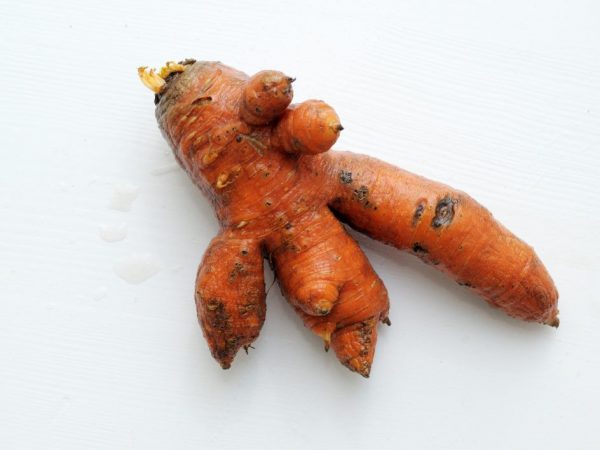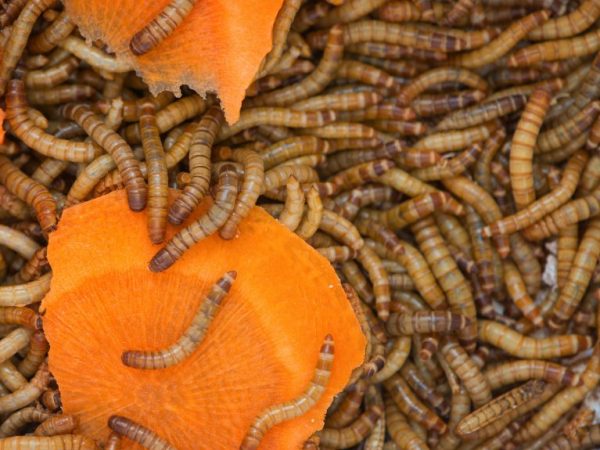Fighting aphids on carrots
Aphids on carrots are rare, however, a rapidly multiplying pest is able to enlarge colonies, taking up to 50 generations in a short time. Eating on vegetable juice, it causes significant damage to vegetable plantings.

Fighting aphids on carrots
Aphid harm to carrots
Carrot aphids inflict the main harm on vegetable crops, sucking vegetable juice from young shoots, buds and leaves, which leads to a deterioration in flowering and fruiting. In this case, the insect is able to emit poisonous substances, under the influence of which the carrot foliage curls, changes shape and subsequently dies off, the shoots stop growing, the upper tier of the plant bends.
Large damages are associated with plant poisoning by viral and bacterial infections through insect saliva, which slows down the development of vegetable crops and lowers the qualitative and quantitative characteristics of vegetables.
Aphids are small harmful insects with white or light green color.
Different types of aphids can settle on carrot plantings, including:
- Carrot aphid. Appears from eggs laid on dried carrot tops.
- Hawthorn. It develops on hawthorn bushes, and in the summer season for food moves to carrot plantings,
- Willow. It lays eggs in the bark of a willow; when warm comes, winged insects migrate to ridges with carrots.
The main place of appearance of the pest is ground shoots and foliage. The primary accompanying feature is the massive arrival of ants. The main migration period occurs in the middle and end of the summer season, when root crops are formed in the vegetable crop.
Favorable factors
Among the factors that favor the entanglement of carrots by aphids are warm sunny weather and drought. The reproduction of the insect is slowed down by a cold snap and prolonged rains.
Most often, the insect appears near the plantings of a number of garden flowers: petunias, begonias, cosmos, nasturtium, poppy, mallow - and some trees: bird cherry, linden and viburnum.
Agricultural technology against aphids
A number of agrotechnical measures help to combat aphids on carrots, for which:
- thoroughly clean the planting areas from the remnants of weeds,
- observe crop rotation,
- on hot days, contributing to the active reproduction of the insect, water the carrot plantings with the sprinkling method, which allows you to knock the pest off the plants,
- between sprinkling, the carrot foliage is powdered with wood ash mixed with tobacco dust and, without fail, half an hour after dusting, the soil is loosened.
The appearance of carrot plantings entangled in aphids is influenced by the type of fertilizer complexes used for feeding. Thus, a large amount of nitrogen fertilizers makes the juice in plant cells sweeter, which attracts aphid colonies. At the same time, plants fed with organic matter that balance metabolic processes and quantitative proportions of sugars become less attractive to harmful insects.
Biological measures against aphids

Birds help fight pests
In addition to correct agricultural practices, it is recommended to use biological methods against the pest.
Attracting natural enemies to the suburban area helps to destroy colonies of harmful insects in a short time. Birds and insects that feed on them:
- sparrow,
- robin,
- warbler,
- titmouse,
- linnet,
- kinglet,
- ladybug,
- wasp,
- predator bug,
- ground beetle,
- fly-surfid,
- lacewing,
- earwig.
To create favorable conditions for insects and birds that feed on the pest, feeders are made and garden plantings are planted, which additionally act as a deterrent for the pest. These plants include:
- mustard,
- Melissa,
- tomatoes,
- chamomile,
- lavender,
- fennel,
- marigold,
- bow,
- basil,
- garlic.
Aphid preparations
The use of chemical and biological agents against aphids is recommended in dry and calm weather, in the morning or evening. All vegetative parts are subject to processing, especially the inner side of the foliage.
Insecticides are addictive in the harmful insect, therefore they should be alternated.
Suitable for use:
- Biological agents, the principle of which is based on the vital activity of soil fungi, including "Fitoverm", "Aversectin". And also made on the basis of permethrin, which include "Iskra", "Kinmiks".
- chemical agents of contact ("Fufanon"), intestinal ("Confidor") and systemic exposure ("Commander"), penetrating through the integument, the digestive system and through the plant cells, respectively.
Traditional methods of dealing with aphids
Among the folk remedies that help to effectively fight aphids on carrots, there are:
- soap solution prepared from 300 g of laundry soap and 10 liters of water,
- ash solution, consisting of 300 g of ash, boiled in 10 liters of water, with the addition of 50 g of soap,
- potato tops, chopped and infused for 3 hours,
- an onion solution from a vegetable chopped with husks (200 g), filled with 10 liters of water,
- a garlic solution made from 200 g of garlic, poured in 1 liter of water and infused for 5 days,
- celandine leaves (3 kg), infused in 10 liters of water for 1 day,
- chamomile infusion of 1 kg of pharmacy chamomile, filled with 10 liters of water and infused for 12 hours.
Conclusion
Aphids on carrots, feeding on plant juices, cause significant damage to plants. Agrotechnical measures, chemical and biological preparations and folk remedies help to fight against harmful insects.


